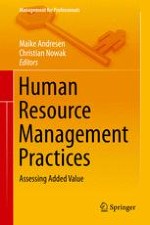2015 | OriginalPaper | Chapter
A Look Into the Future: Is Working Time Freedom Apt to Add Value for Different Stakeholders?
A Discussion with Experts in the Field
Author : Maike Andresen
Published in: Human Resource Management Practices
Publisher: Springer International Publishing
Activate our intelligent search to find suitable subject content or patents.
Select sections of text to find matching patents with Artificial Intelligence. powered by
Select sections of text to find additional relevant content using AI-assisted search. powered by
